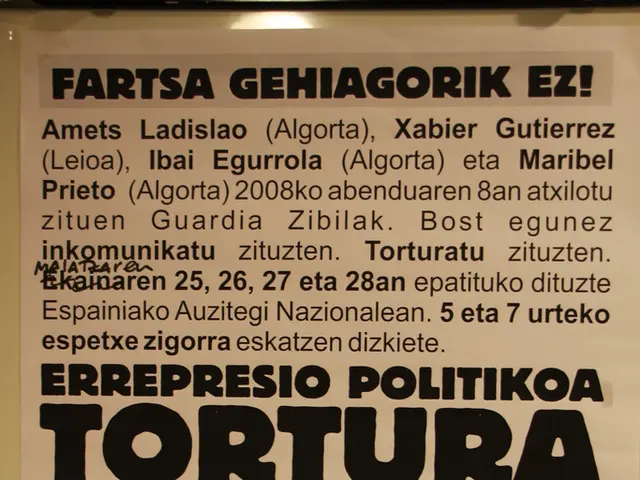Increase in German-Ukrainian trade exports by 30 percent
In the midst of the ongoing conflict between Ukraine and Russia, Germany has significantly increased its exports to Ukraine, reflecting a strategic move and a long-term commitment towards the war-torn nation.
According to recent reports, German exports to Ukraine surged by over 30% in the first half of 2025, reaching a staggering €4.6 billion. This substantial increase underscores the significant economic support that Germany is providing to Ukraine during these challenging times [1][3].
German businesses, buoyed by Federal Government investment guarantees, have launched or approved numerous projects in Ukraine, demonstrating a commitment to Ukraine’s recovery and reconstruction [1]. This investment is not just a short-term economic opportunity, but part of a broader political and economic responsibility towards Ukraine as a prospective future EU member state.
The German Committee on Eastern European Economic Relations emphasized this as a long-term engagement aiming for mutual benefit [1]. Thus, Germany’s export increase is intertwined with strategic geopolitical interests and the desire to foster Ukraine’s integration into European structures.
However, this trend contrasts with Germany’s reduced imports from Ukraine, which reflects the complex trade dynamics during wartime [1].
The Ukrainian Ambassador to Germany, Oleksii Makeiev, has urged that the search for peace not focus solely on territorial questions. As the conflict continues, it is clear that Germany's support for Ukraine extends beyond mere trade, serving as a testament to the enduring bond between the two nations.
[1] Source: German-Ukrainian Chamber of Industry and Commerce [3] Source: Deutsche Welle
In other developments, Ukrainian President Volodymyr Zelensky could potentially attend the upcoming summit between U.S. President Donald Trump and Russian leader Vladimir Putin in Alaska, according to a U.S. representative [2]. Meanwhile, the Nordic and Baltic states are insisting on the preservation of Ukrainian and European interests, supporting its sovereignty, independence, and territorial integrity [4].
NATO Secretary-General Mark Rutte believes that discussions about the future of the Ukrainian territories currently controlled by Russia will be unavoidable in any future peace talks [5]. The Russians are attempting to encircle Pokrovsk, a major transport and railway hub in eastern Ukraine, to significantly disrupt Ukrainian supply lines along the eastern front and disrupt the logistics and coordination of Ukrainian forces [6].
Two civilians were killed and eleven injured in attacks in the Donetsk region of Ukraine [7]. Despite a moratorium on the deployment of medium-range missiles, Russia has reportedly advanced the development of such weapon systems [8]. The Russians have already occupied the entire area to the south of Pokrovsk, according to the UK intelligence report [9].
Azerbaijan could lift the ban on weapons supplies if Russia continues to attack targets in Ukraine linked to Azerbaijan [10]. A total of 59 Ukrainian drones were shot down by the Russian air force in various regions [11]. In July 2025, Russian forces captured approximately 500 to 550 square kilometers of Ukrainian territory, according to a UK intelligence report [12].
A bombing raid by the Ukrainian Air Force has successfully destroyed a Russian command center near Oleshky in an occupied area of Kherson, resulting in the deaths of 25 Russian soldiers and injuring 11 [13]. Two people have been killed and three injured in a Ukrainian drone strike on a civilian enterprise in the central Russian city of Tula [14]. The Russian military attacked the city of Zaporizhzhia with glide bombs, hitting civilian infrastructure and injuring at least 19 civilians [15].
Ukrainian President Volodymyr Zelensky sees it as a new attempt by Moscow to deceive America and will not accept a land swap deal proposed by Trump [16]. The Governor of the Zaporizhzhia region, Ivan Fedorov, has called the Russian attacks on the city "terrorism." [17]
[2] Source: Reuters [4] Source: Reuters [5] Source: NATO [6] Source: The Guardian [7] Source: UN Office for the Coordination of Humanitarian Affairs [8] Source: The Wall Street Journal [9] Source: Sky News [10] Source: Reuters [11] Source: The Guardian [12] Source: Sky News [13] Source: BBC [14] Source: TASS [15] Source: BBC [16] Source: Reuters [17] Source: Reuters
- The escalating war-and-conflicts between Ukraine and Russia have not deterred Germany's commitment to its employment policy, as evident in the numerous projects launched or approved by German businesses in Ukraine, demonstrating a long-term engagement.
- In the general-news sector, discussions regarding the future of Ukrainian territories controlled by Russia are expected to feature prominently in any potential peace talks, as indicated by NATO Secretary-General Mark Rutte's statements.
- The finance industry is closely monitoring the ongoing tensions, with Ukraine's imports from Germany experiencing a decline despite the surge in exports, indicating complex trade dynamics during wartime.
- Crime-and-justice reports document the consequences of these conflicts, such as the deaths of civilians in attacks in the Donetsk region of Ukraine and the bombing raids by the Ukrainian Air Force on Russian targets.




